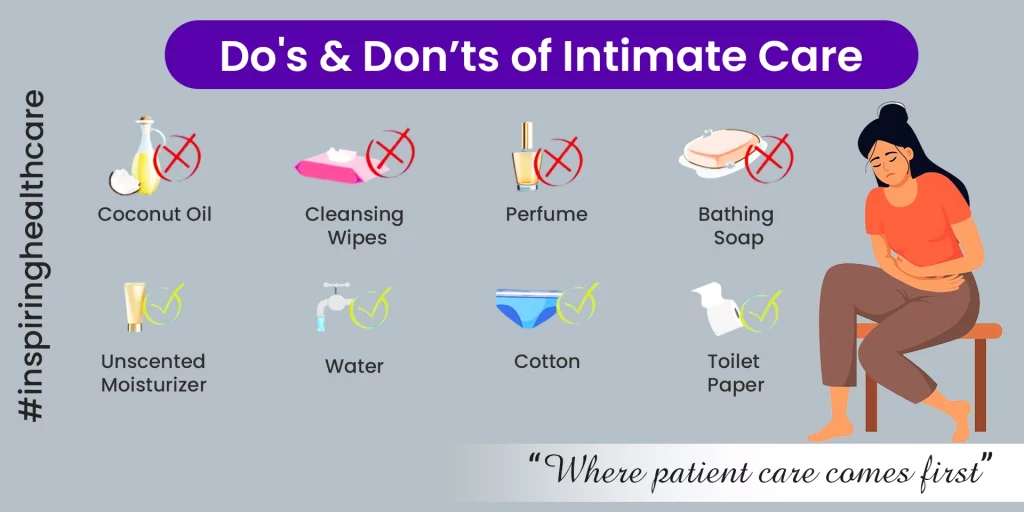In today’s world, discussions about intimate hygiene remain shrouded in myths, misconceptions, and societal taboos. Yet, the health and well-being of our intimate areas are just as vital as any other aspect of our bodies. For Gen Z women, navigating through the maze of conflicting advice and cultural norms can be daunting. That’s why this guide aims to demystify intimate hygiene, providing clear dos and don’ts to help young women confidently prioritize their intimate health.
From understanding the intricacies of the female reproductive system to addressing common concerns like vaginal odor and menstrual discomfort, this guide covers it all. We’ll debunk myths, provide practical tips, and encourage open dialogue about intimate health.
By empowering Gen Z women with knowledge and breaking down societal barriers, we aim to foster a generation that prioritizes their well-being and advocates for inclusive and comprehensive sexual education. So, let’s dive in and embark on a journey to optimal intimate health together.
Also Read: Understanding Menstrual Health: Tips and Advice
Understanding Intimate Hygiene
Intimate hygiene involves maintaining cleanliness and health in the external genital area, including the vulva. It means gently cleansing the vulvar region to prevent the buildup of contaminants like sweat, urine, and fecal matter, thereby reducing the risk of vulvovaginal disorders. Proper intimate hygiene is needed to maintain the normal pH level and microbiota, which are essential for protection against infections.
The female reproductive system comprises internal and external organs responsible for hormone production, fertility, menstruation, and sexual activity. The external genitals, collectively known as the vulva, include the mons pubis, labia majora, labia minora, clitoris, and vestibule. The vagina, a muscular tunnel-like organ, connects to the uterus and hosts a healthy population of microorganisms that guard against infections. Internal organs such as the ovaries, fallopian tubes, and uterus play crucial roles in egg production, fertilization, and pregnancy.
Several factors influence intimate health, including hormonal changes, the menstrual cycle, sexual activity, and hygiene practices. Hormonal shifts, like those during menopause, can disrupt the vaginal microbiota, increasing vulnerability to vulvovaginal infections. Changes in the menstrual cycle can affect vaginal discharge quality, while sexual activity can impact vaginal microflora. Proper hygiene practices, including the use of feminine hygiene products, can affect the biological balance of the vulvar area. Therefore, it’s crucial to prioritize gentle cleansing to uphold intimate health.
Also Read: Sexual Health Education for Women: Beyond the Basics
The Dos of Intimate Hygiene
The dos of intimate hygiene:
- Regularly wash with plain water or mild, unscented soap: Clean the external genital area daily with water, avoiding scented soaps or gels.
- Wear clean underwear made of breathable fabrics: Opt for breathable cotton underwear and change them regularly to prevent moisture build-up.
- Maintain a balanced diet and stay hydrated: A balanced diet and adequate hydration contribute to overall health, including intimate health.
- Change sanitary products frequently during menstruation: Change tampons, pads, or liners every 4-6 hours to maintain hygiene and prevent infections.
- Schedule regular check-ups with a gynecologist: Annual gynecological check-ups are crucial for preventive healthcare and addressing any concerns related to intimate health.
- Practice safe sex to prevent sexually transmitted infections (STIs): Prioritize safe sex practices such as using condoms and undergoing regular STI screenings.
These recommendations underscore the importance of gentle vulvar cleansing, maintaining the normal pH level and microbiota, and understanding the impact of various hygiene practices on vulvovaginal health.

The Don’ts of Intimate Hygiene
The Don’ts of Intimate Hygiene:
- Avoid harsh soaps or douching products: The vagina doesn’t need douching, and using strong or perfumed soaps can upset its natural acidity, causing dryness, itching, and irritation.
- Don’t overwash or scrub excessively: Overwashing can strip away healthy bacteria, making way for harmful ones, and leading to symptoms and infections. Stick to washing the genital area once a day with plain water or a gentle, pH-balanced wash.
- Steer clear of tight clothing: Clothing that’s too snug, especially synthetic fabrics, traps moisture and heat, creating a breeding ground for bacteria. Opt for breathable cotton underwear and avoid tight pants.
- Say no to scented products: Perfumes, deodorants, and powders should stay away from the vaginal area as they disrupt its natural pH, irritating. Stick to mild, unscented products to maintain a healthy environment.
- Don’t ignore symptoms: Any unusual signs like itching, redness, or unusual discharge shouldn’t be brushed off. Seek medical help promptly.
- Avoid sharing personal items: Towels or underwear shouldn’t be shared to prevent the spread of bacteria and infections.
These recommendations aim to preserve the vagina’s natural balance and acidity while preventing irritation, infections, and discomfort.
Also Read: The Importance of Regular Gynecological Check-ups
Addressing Common Concerns
Dealing with Vaginal Odor: Understanding Normal and Abnormal Odors
- Normal vaginal odor is influenced by healthy bacteria and factors like sweating, sexual activity, and the menstrual cycle.
- A persistent strong odor may indicate health issues such as bacterial vaginosis, trichomoniasis, a forgotten tampon, or poor hygiene.
- Maintain good hygiene by washing with warm water, avoiding overwashing or scented soaps, and wearing breathable cotton underwear.
- Avoid perfumes, powders, or deodorant sprays in the vaginal area.
- Seek medical advice promptly if accompanied by itching, burning, discharge, or irritation.
Managing Vaginal Discharge: Understanding Normal Changes and Warning Signs
- Vaginal discharge varies throughout the menstrual cycle and can be influenced by sexual arousal and stress.
- Normal discharge is typically clear or white with a mild odor.
- Changes like increased discharge, color or odor changes, or itching, irritation, or pain may signal an issue.
- Prioritize good hygiene, wear breathable cotton underwear, and avoid scented products.
- Change tampons, pads, and liners frequently.
- Seek medical attention for noticeable changes in discharge characteristics or other symptoms.
Coping with Menstrual Discomfort: Tips for Relief
- Use heat therapy like a heating pad or warm bath for cramp relief.
- Engage in regular physical activity to reduce pain and discomfort.
- Try over-the-counter pain relievers.
- Practice relaxation techniques like deep breathing or meditation to manage stress.
- Maintain a balanced diet and stay hydrated to support overall health and manage symptoms.
- Consult a healthcare provider if menstrual discomfort is severe or significantly affects daily life.
Cultural and Social Considerations
Addressing Cultural Barriers to Intimate Hygiene:
- Breaking Down Taboos and Stigmas:
- Cultural taboos and stigmas hinder proper care for intimate health.
- Rooted in cultural beliefs, religious practices, and societal norms.
- Dismantle barriers through open communication and education.
- Importance of Open Communication:
- Vital for addressing intimate health concerns and promoting well-being.
- Discuss topics like menstrual health and sexual activity openly.
- Healthcare providers offer education, resources, and judgment-free support.
- Advocating for Comprehensive Sex Education:
- Essential for fostering healthy attitudes and behaviors.
- Covers menstrual health, contraception, and STI prevention.
- Addresses gender and sexual diversity and promotes informed decision-making.
In summary, prioritizing open communication, education, and advocacy helps create a more inclusive approach to intimate health, breaking down cultural and social barriers.
Whether you’re seeking guidance on intimate hygiene, menstrual health, or other concerns, Sanjivini Super Specialty Hospital Lucknow, is here to support you every step of the way. Your health is our priority.

